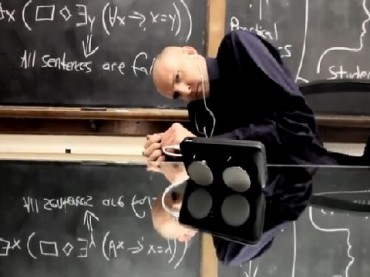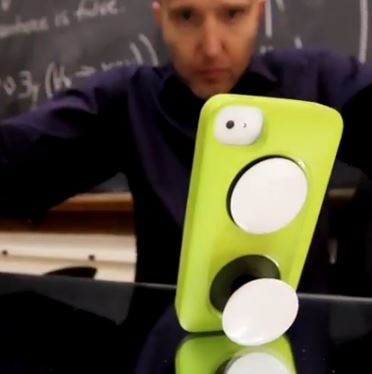
David Barnett faced a low point in his life when his house was destroyed by fire in 2010.
The 43-year-old associate professor of philosophy at the University of Colorado – Boulder says he was stunned and shell-shocked. He’d lost almost everything.
Yet despite the tragedy, he retained his creativity, quirkiness – and desire to be the next tech-gadget entrepreneur to sweep the nation. And ironically, it was the fire that helped him get there.
Barnett invested his insurance money to help bring his brainchild – PopSockets – to life, and to the mass market.
“So the fire was quite good for me,” Barnett said. “I never could have afforded it without the fire.”
Today – after five years of hard work, 60-plus prototypes, Kickstarter hiccups, and that fire – and his dream is now a reality.
PopSockets are an accessory for smart phones and iPods. They’re two circular gadgets that connect to the back of tech devices and can expand out like an accordion a few inches, serving as a headset cord wrap, handgrip, a way to prop up the device, or a tool to help text or take photos with just one hand.
Barnett’s ah-ha moment began in December 2009, when he set out to resolve the problem of tangled headsets during his workouts at the CU Recreation Center.
For the earliest model, Barnett affixed two large buttons to the back of his iPod. The buttons allowed him to wind up his headset without tangling them, though the solution had drawbacks.
“I got made fun of a lot because it was so ugly and bulky,” Barnett said. “But then I found a way to make them collapse.”
Finding the right recipe for collapsible sockets was no picnic, since he had to find a material supple enough to collapse yet rigid enough to stay collapsed when desired. Barnett prototyped about 60 different versions of PopSockets before he found a model with all the desired qualities.
PopSockets made their public debut in early 2012 on Kickstarter.com, a website that allows entrepreneurs to attract investors for their products with videos.
Barnett’s video has him dancing in the philosophy department’s Morris Reading Room while demonstrating the many uses of PopSockets. He portrays himself graciously accepting a Nobel Prize for his brainchild.
The comedic, booty-shaking video garnered mixed reviews from the gadget-nerd-o-sphere.
Matthew Humphries of Geek.com wrote of Barnett: “[Barnett’s Kickstarter] video is either a love or hate affair depending on your tastes, but if you hate it, you definitely shouldn’t overlook what could be a very useful case design.”
One Kickstarter commenter was less nuanced: “Pay him whatever he wants… as long as he quits dancing.”
Barnett met his $12,000 dollar goal within five days, providing him with ample reason to dance. All told, he managed to net $18,591 dollars from his efforts. Barnett also netted $2,500 dollars for winning the 2012 Mercedez-Benz “Fueling Innovation” competition hosted by Wired Magazine.
A deal with Case-Made looked promising last year, but ultimately didn’t pan out as hoped. Barnett offered refunds to about 25 percent of his Kickstarter backers who felt frustrated by the delays.
The first taste of commercial success came when Barnett found a manufacturer in China last year. Last October, his technology became patented, and in November, his product became available online.
So far, Barnett has sold over 1,000 pairs—without any major advertising campaign.
With that, Barnett was able to reward a majority of his backers who stuck it out with credit at his website.
One early fan is Barnett’s colleague in the philosophy department, Associate Professor Chris Heathwood, who claims that no fewer than five pairs of PopSockets are known to exist at the Heathwood residence.
“I like the photo grip,” Heathwood said, demonstrating a “selfie” pose with his phone. “The grip is surprisingly nice. So if I’m taking pictures, I can do one hand pretty easily.”
Barnett said the PopSocket future looks as bright as the PopSockets themselves, which feature a variety of hip and colorful designs. A new PopSockets case for the Iphone 5 is forthcoming, as are several major business deals.
And Barnett claims that he will soon unveil new products that use his now-patented technology.
“People said to me: ‘What if you don’t sale a single one? You’ve put all that work and money into it for nothing,’” Barnett said. “I can probably honestly say it wouldn’t bother me a bit. I’ve had fun and I’ve learned a lot.”
He later added, “It would be great, though, if people actually bought these on the market.”
Barnett lives in Boulder, Colo., with his wife, Nikki, and their 4-month old daughter, Emily.
Fix contributor Spencer Case is a philosophy graduate student at the University of Colorado. He is a U.S. Army veteran of Iraq and Afghanistan and an Egypt Fulbright alumnus.
Like The College Fix on Facebook / Follow us on Twitter





Please join the conversation about our stories on Facebook, Twitter, Instagram, Reddit, MeWe, Rumble, Gab, Minds and Gettr.